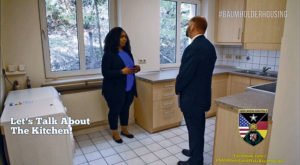This time of year usually brings the sight of packing material and shipping containers stacked like skyscrapers, the ripping sound of packing tape, a plethora of housing appointments, and the various to-do lists that come with a permanent change of station move.

However, this PCS season has been put on hold for most service members and their families due to the Stop Movement order issued by the Secretary of Defense in early March. The order, extended to June 30, leaves upwards of 100,000 moves on hold across the Department of Defense.
Along with the change, the U.S. Army Garrison Rheinland-Pfalz Housing Office has adapted, like many other customer-service agencies, by expanding virtual services and accommodating needs in a digital environment.
From idea to implementation, the housing staff have streamlined the delivery of their services through technological means and face-to-face appointments in accordance with physical distancing and face-covering mandates, to include use of a centralized email address to schedule appointments and transfer housing documentation.
“The dedication and efforts of the housing office continue to be instrumental in caring for the residents within the military community,” said Charm Sutton, Housing Services chief. “I am honored to help Soldiers and their families and anything I can do to bring peace of mind is satisfying, especially during these times.”
The responsiveness of the housing services staff has propelled them to innovatively care for approximately 800 occupants in government quarters and roughly 600 residents in off-post housing, said Sutton.
Most of the residents who are reaching out to the housing office during the Stop Movement order are individuals who have an exception to policy, retirement orders, or separation orders, according to Harald Kastner, Housing Division chief.
“So now, when managing this crisis, I think we are doing better service to the community because they do not have to come back and forth to the housing office. The process is quicker than before,” Kastner said.
Adapting to restrictions on the normal ways of doing business has prompted the housing office to increase use of electronic communication and digital services for future PCS moves to continue the operational success once the stop movement order is lifted, said Kastner.







